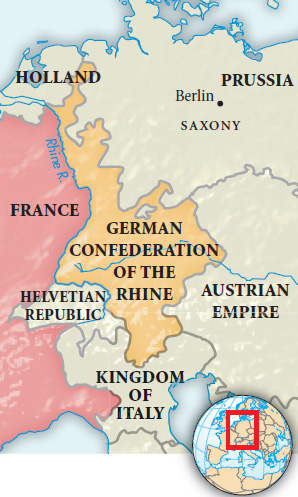A History of Western Society: Printed Page 636
A History of Western Society, Value Edition: Printed Page 642
Napoleon’s Expansion in Europe

Napoleon was above all a great military man. After coming to power in 1799, he sent peace feelers to Austria and Great Britain, the two remaining members of the Second Coalition that had been formed against France in 1798. When they rejected his overtures, Napoleon’s armies decisively defeated the Austrians. In the Treaty of Lunéville (1801), Austria accepted the loss of almost all its Italian possessions, and German territory on the west bank of the Rhine was incorporated into France. The British agreed to the Treaty of Amiens in 1802, allowing France to control the former Dutch Republic (known as the Batavian Republic since 1795), the Austrian Netherlands, the west bank of the Rhine, and most of the Italian peninsula. The Treaty of Amiens was a diplomatic triumph for Napoleon, and peace with honor and profit increased his popularity at home.
In 1802 Napoleon was secure but driven to expand his power. Aggressively redrawing the map of Germany so as to weaken Austria and encourage the secondary states of southwestern Germany to side with France, Napoleon tried to restrict British trade with all of Europe. He then plotted to attack Great Britain, but his Mediterranean fleet was destroyed by Lord Nelson at the Battle of Trafalgar on October 21, 1805. Invasion of England was henceforth impossible. Renewed fighting had its advantages, however, for the first consul used the wartime atmosphere to have himself proclaimed emperor in late 1804.
Austria, Russia, and Sweden joined with Britain to form the Third Coalition against France shortly before the Battle of Trafalgar. Actions such as Napoleon’s assumption of the Italian crown had convinced both Alexander I of Russia and Francis II of Austria that Napoleon was a threat to the European balance of power. Yet they were no match for Napoleon, who scored a brilliant victory over them at the Battle of Austerlitz in December 1805. Alexander I decided to pull back, and Austria accepted large territorial losses in return for peace as the Third Coalition collapsed.
Napoleon then proceeded to reorganize the German states. In 1806 he abolished many of the tiny German states as well as the ancient Holy Roman Empire and established by decree the German Confederation of the Rhine, a union of fifteen German states minus Austria, Prussia, and Saxony. Naming himself “protector” of the confederation, Napoleon firmly controlled western Germany.
Napoleon’s intervention in German affairs alarmed the Prussians, who mobilized their armies after more than a decade of peace with France. Napoleon attacked and won two more brilliant victories in October 1806 at Jena and Auerstädt, where the Prussians were outnumbered two to one. The war with Prussia, now joined by Russia, continued into the following spring. After Napoleon’s larger armies won another victory, Alexander I of Russia was ready to negotiate the peace. In the subsequent treaties of Tilsit in 1807, Prussia lost half of its population, while Russia accepted Napoleon’s reorganization of western and central Europe and promised to enforce Napoleon’s economic blockade against British goods.